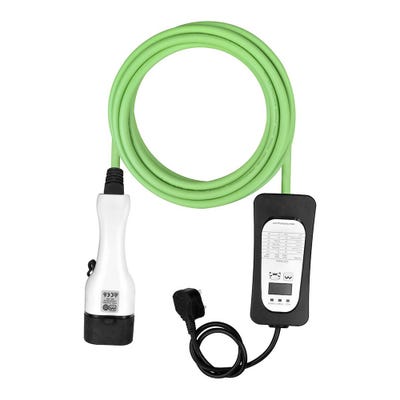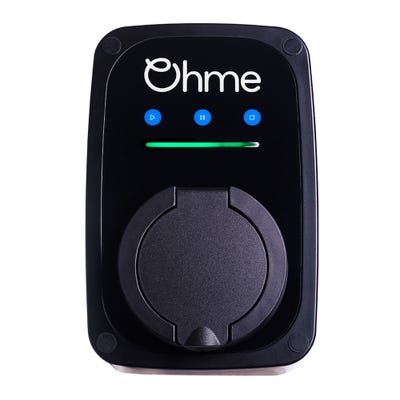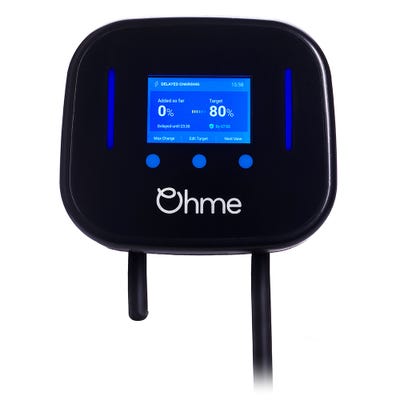EV Chargers
Choose a greener way to charge with our range of EV chargers at Builder Depot. Installing a 7kW EV home charger is a smart, energy-efficient solution that makes charging your electric vehicle more convenient and cost-effective. Whether you need a tethered EV charger or a Type 2 charging cable, our selection offers reliable options for safe home use. With electric vehicles leading the way in sustainable transport, now is the perfect time to make the switch. Browse our EV charger products online today and enjoy trusted quality and competitive trade prices.
Read More Read LessWhat is an EV charger?
An EV charger, or electric vehicle charger, is used to recharge the battery in an electric car or plug-in hybrid. Just like you’d fill up a petrol tank at a fuel station, an EV charger supplies power to your car so it can run.
At its core, an EV charger acts as the bridge between your car and the electricity supply, safely managing the flow of power to avoid overloading your car’s battery or your home’s electrical system.
Whether you’re a homeowner installing a wall-mounted unit in the garage or a business looking to offer customers convenient charging on site, choosing the right type of EV charger is key for speed, efficiency and safety. As more people switch to electric vehicles in the UK, having access to a charging station is growing in demand.
How do EV chargers work?
An EV charger works by taking electricity from the grid, or from a renewable energy source like solar panels, and transferring it to your car’s battery. When you plug the charger into your vehicle, it communicates with the car’s internal systems to determine how much power the battery needs.
Most home and workplace chargers supply alternating current (AC), which your car then converts into direct current (DC) using its onboard converter. Rapid chargers, often found at motorway service stations, skip this step and supply DC straight into the battery, allowing for much faster charging times.
Smart EV chargers monitor your home’s energy use and adjust the charge rate to avoid overloading your electric system. They can also delay charging to off-peak hours to save money.
What types of EV chargers are available?
There are three main types of EV chargers available in the UK: slow, fast, and rapid.
Slow chargers, usually rated at up to 3kW, often use a standard 3-pin plug and are best suited for overnight charging when time isn’t an issue.
Fast chargers, typically rated between 7kW and 22kW, are the most common choice for home and commercial installations. A 7kW unit can fully charge most EVs overnight, while 22kW models, used on three-phase power, are more suitable for workplaces.
Then there are rapid chargers, starting at 40kW, which are found in public places like motorway service stations. These charge cars up to 80% in as little as 30 minutes, using DC power to bypass the vehicle’s onboard charger.
When selecting a charger, you’ll need to consider your available power supply, daily mileage, charging time, and whether it’s for domestic or business use.
What’s the difference between Type 1 and Type 2 connectors?
When it comes to EV chargers, Type 1 and Type 2 refer to the style of plug on the charging cable.
A Type 1 connector has a 5-pin design. It is typically used on older electric vehicles or those imported from the United States and Asia. Type 1 chargers only support single-phase charging, which means it will take longer to charge your car.
Type 2 chargers are standard across the UK and Europe. These feature a 7-pin configuration and support both single-phase and three-phase power, allowing for faster, more efficient charging. Most modern EVs now use a Type 2 connector because they’re more compatible with public charge points.
A key visual difference is the shape: Type 1 has a latch to keep it locked in place, while Type 2 is designed to twist and lock, offering a more secure connection. When buying a charger, it’s crucial to match the connector type with your car. Type 2 is now the go-to option for most UK installations.
What is a tethered EV charger?
A tethered EV charger is a wall-mounted unit with a fixed charging cable already attached. This means you won’t need to buy or bring your own charging lead, just unwind the existing cable and plug it straight into your vehicle.
This makes tethered options a convenient, time-saving option for everyday use. Tethered chargers are usually available with either Type 1 or Type 2 plugs, so you’ll want to make sure it matches your car’s connector type before installation.
The cable length typically ranges between 4 to 8 metres, allowing for a bit of flexibility in where you park. These chargers are ideal for homeowners who want a convenient setup and don’t mind having the cable permanently visible on the wall. Because the lead is hardwired, it’s also less likely to get lost or damaged compared to a portable version.
What is an untethered EV charger?
An untethered EV charger, also known as a socketed charger, doesn’t come with a built-in charging cable. Instead, you use your own detachable lead, which plugs into both the charger and your electric vehicle.
This gives you more flexibility, and is especially useful if you have multiple EVs with different plug types. Untethered units also look tidier when not in use, since there’s no dangling cable permanently fixed to the wall.
What size cable for an EV charger?
Choosing the right cable size for an EV charger is essential to ensure both safety and performance. The cable must be thick enough to handle the electrical load without overheating, especially over longer distances.
For a standard 7kW charger, which is common for UK homes, a 6mm² or 10mm² cable is typically used, depending on the length of the run and installation method. When you purchase your EV charger, the recommended cable size will usually be mentioned in the product data sheet.
If the cable run is particularly long or you’re using a more powerful 22kW three-phase charger, you might need 16mm² or even thicker cable. Other factors like insulation type, how the cable is routed (buried, in trunking, or surface-mounted), and ambient temperature can also affect the cable choice.
Can I install my own EV charger?
No, you should never attempt to install your own EV charger unless you are a qualified, Part P-registered electrician with EV-specific training. This is because electric vehicle chargers operate at high power levels, requiring a dedicated circuit, proper circuit protection, and compliance with strict wiring regulations. DIY installations not only void warranties, but can also invalidate your home insurance and put your property at risk of fire or cause electrocution.
All EV charger installations must be notified to your local Distribution Network Operator (DNO), and this process is handled by a certified installer. Additionally, many EV chargers are only eligible for grants and warranties if installed by an OZEV-approved professional. So, in short, it’s not worth the risk to install your own EV charger.
What is the cost of installing a home EV charger?
Installing a home EV charger in the UK usually costs between £800 and £1,200, though this can vary depending on your property, the charger model, and installation complexity. The base price includes the charger unit itself, often a 7kW model for single-phase homes, along with the installation by a qualified electrician.
Factors that can increase the price include long cable runs from your consumer unit, the need to upgrade your consumer unit, or additional trenching or wall work. Smart features, solar integration, and app connectivity can also add to the cost. Some installers bundle in extra services like load balancing, surge protection, or even Wi-Fi signal boosters for smart chargers.
Do I need a dedicated power supply for a home EV charger?
Yes, a dedicated power supply is essential for safely operating a home EV charger. This means your charger needs its own circuit directly connected to your consumer unit, complete with its own RCBO or RCD protection and appropriately sized cabling. Sharing a circuit with other household appliances can lead to overheating, nuisance tripping, or, worse, electrical fires. EV chargers draw a consistent high load, typically 32 amps for a 7kW unit, so the rest of your home’s wiring needs to be protected from overload.
Your installer will assess your existing electrical capacity and might need to upgrade your consumer unit or install a load management device. The dedicated supply also makes it easier to monitor energy use, add smart features, or integrate your charger with solar panels down the line. Without a dedicated power supply, you risk damaging your charger, your vehicle, and your property.
Do I need planning permission to install one?
In most cases, you won’t need planning permission to install an EV charger at home, especially if it’s mounted on a driveway or garage wall and meets standard size and location guidelines. However, there are exceptions. If your property is a listed building, within a conservation area, or if you live in a flat or maisonette, then additional rules may apply. When in doubt, it’s best to check with your local planning authority.
How much does it cost to charge an electric car with a 3-pin plug?
Charging an electric car using a standard 3-pin plug is one of the slowest but most accessible ways to top up your battery. The cost of a full charge depends on your electricity tariff and the size of your vehicle’s battery. On a standard UK rate of about 30p per kWh, charging a 40kWh battery from empty would cost around £12, while a 60kWh battery could cost about £18.
However, using a 3-pin plug isn’t ideal for regular use as it takes 12 to 24 hours to fully charge most EVs and places long-term strain on your sockets. Some energy suppliers offer off-peak EV tariffs (e.g. 7.5p per kWh overnight), which can significantly lower charging costs.
Are there any government grants or incentives available in the UK?
Yes, there are government-backed schemes available in the UK to help reduce the cost of installing EV chargers, though they’ve become more targeted in recent years. The EV chargepoint grant (replacing the Electric Vehicle Homecharge Scheme) offers up to £350 or 75% off the cost of installing a home charger, but it’s now only available to renters, flat owners, and landlords.
To qualify, you must use an OZEV-approved charger installed by a certified installer, and your property must have off-street parking. For businesses and public sector sites, the Workplace Charging Scheme offers similar financial support, up to £350 per socket, for up to 40 sockets per applicant. However, this scheme does close in March 2026.
How long does it take to charge an electric car?
The time it takes to charge an electric car depends on three key factors: the battery size, the power output of the charger, and the state of charge when you plug in.
With a 3-pin plug (2.3kW), charging can take 12 to 24 hours depending on battery size. A 7kW home charger, which is the most common residential option in the UK, typically charges an EV from empty to full in 6 to 8 hours, making it perfect for overnight top-ups.
A 22kW charger, which requires a three-phase power supply, can reduce this to around 2 hours, but not all cars can handle that rate. For rapid top-ups, DC chargers found at public charging stations can deliver an 80% charge in 30 to 60 minutes.
Can I use solar panels to power my EV charger?
Yes, pairing solar panels with an EV charger is not only possible, but it’s one of the most sustainable ways to power your electric vehicle. To do this, you'll need a solar-compatible charger, often known as a solar EV charger or hybrid charger.
These units are designed to prioritise free solar energy for charging, pulling from the grid only when needed. Some systems can also be combined with a home battery storage solution, allowing you to store excess solar energy during the day and use it to charge your car at night.
While the upfront cost is higher, especially if adding batteries, the long-term savings can be substantial. You reduce your carbon footprint, cut your reliance on grid electricity, and protect yourself from rising energy costs. Some solar chargers even allow app control and scheduling so you can optimise your use of sunlight. This makes solar EV charging a great option for homeowners looking to create a greener, self-powered charging setup.





